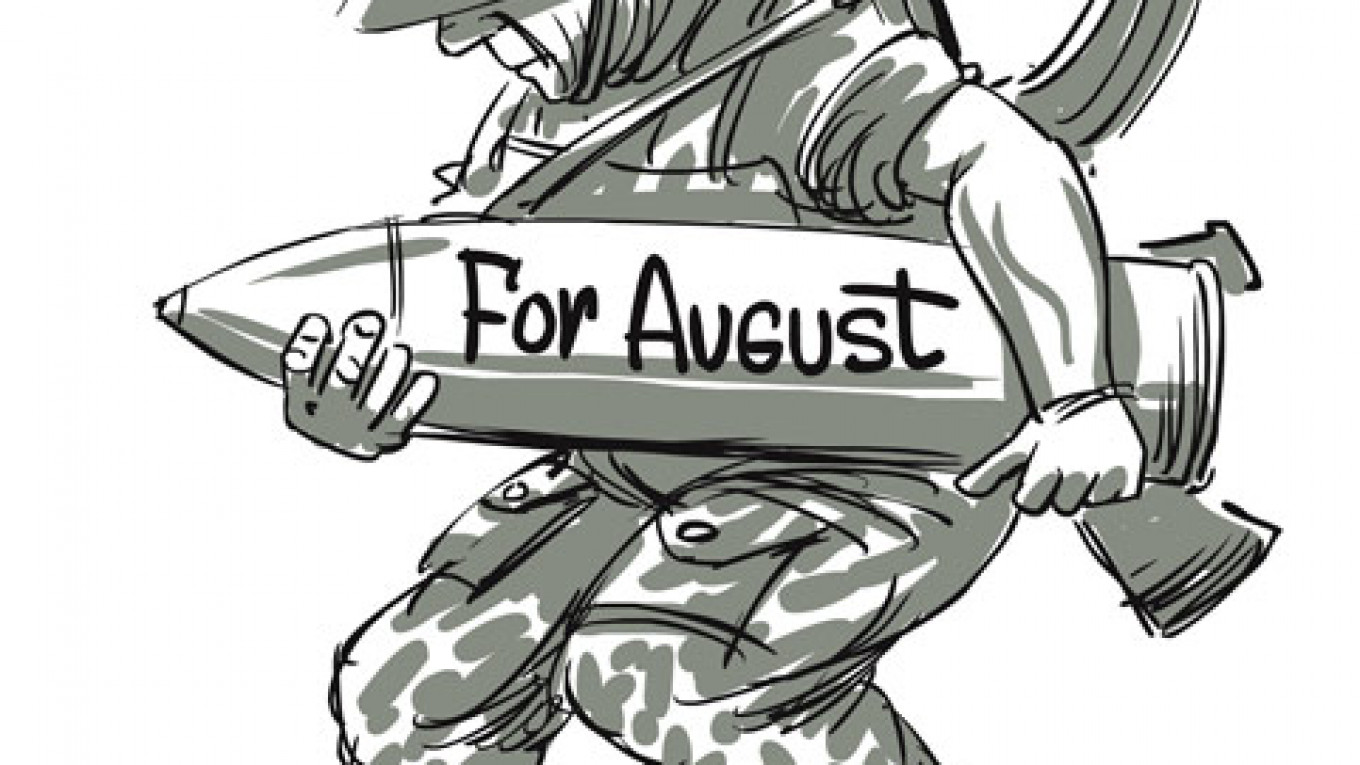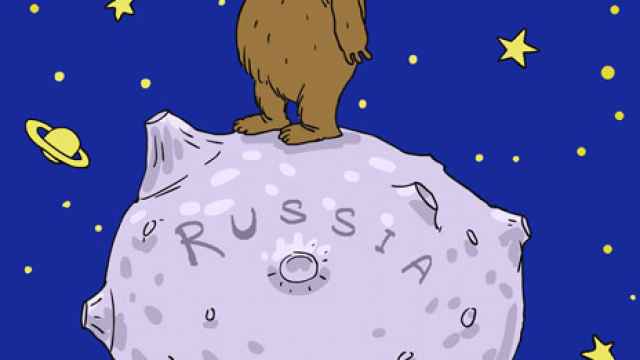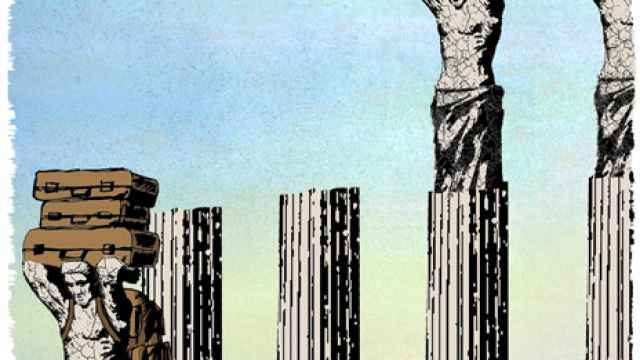As I write this article, I am aware, as I have been every day for the last year, that despite any number of Minsk agreements, we have reason to believe that the war in eastern Ukraine could suddenly intensify in scope and violence at any moment.
In the first half of August, more than any other time of the year, the war in Ukraine recalls another — the war in Georgia, which began during the night on Aug. 7, 2008.
The daily paper I was working for at the time came out the morning of Aug. 8 with a headline that had already been catastrophically contrary to fact for several hours by the time the issue hit newsstands: "Mikheil Saakashvili orders cease-fire."
When the issue was approved on the evening of Aug. 7, before we received information about the intensive artillery assault on Tskhinvali, I had every reason to mention in a headline the Georgian cease-fire proposal, which had been under discussion immediately prior to the war. This story of a journalist acting on the information available to him at the time of print reminds me of two important things.
First, when analyzing events, it's best to avoid oversimplification. Otherwise, in the evening you'll be sure that by morning, opposing troops on the front lines will be leaving their posts to exchange hugs and head off the field with their armored vehicles, when in fact, you wake up to the roar of rocket launchers and the vision of a possible world war approaching.
Second, if we don't make an effort to understand the nuances of the situation, we will all remain in the embarrassing position of that Moscow newspaper announcing a cease-fire, printed when military actions were already under way and people were dying.
A lack of interest in nuances also prevents us from understanding the current war, taking place not only in eastern Ukraine, but in the offices where decisions about sanctions and counter-sanctions are made, and — alas — in the homes of those people, mostly in Russia, where the effects of sanctions are already being felt. That is, the majority of people in Russia.
The inevitable argument that since those people voted for the Russian government, and therefore for the war, they deserve what they get seems pretty far-fetched to me. It is often introduced out of that same desire for inappropriate oversimplification.
There is certainly quite a bit to examine behind those simplified versions of events. For example, the fact that the war in Georgia — Russia's first attempt since the fall of the Soviet Union to change the status quo established after 1991 — was interpreted in the West only as an attempt at aggressive revisionism. No arguments here, that's what it was. But while they're looking at those trees, Western commentators are losing sight of, if not a forest, then at least some other trees.
The smallest of those is the fact that the territories of Abkhazia and South Ossetia were not under the control of the central Georgian government prior to August 2008, and some would say not since the fall of the Soviet Union. Up until the mid-2000s, though, Moscow officially recognized the Georgian government's control of these territories. Georgia thought of itself as a country existing within the borders of the Georgian Soviet Socialist Republic as in 1991, and created an imaginary political whole, which did not exist in reality.
A much bigger tree is the fact that judgment of Russia as a revisionist and aggressor completely distracted Western political thinkers from asking the logical question: Was the post-Soviet status quo really so wonderful, if Russia was prepared to confront those who were strategic partners at the time to re-examine and change it?
Comparing modern Russia with Germany in the first half of the 20th century is quite a stretch, although the idea is now widespread. But the categorical refusal of the keepers of the current status quo to consider the point of view of a country which is not satisfied with that status quo is what actually creates parallels between these two very different episodes of European history, separated by almost a century.
It's that impressive span of time, during which it seemed that the mistake made with Germany had been understood and remembered, that under no conditions did it make sense to humiliate and corner a potentially strong and dangerous opponent, even one in a weakened condition, that makes today's exact replication of such out-of-date approaches surprising. Perhaps, however, these approaches never went out of date.
Maybe it was just a handful of naive idealists, far from political realism, who foolishly thought the world that watched the Berlin wall come down had become more humane than it was before the fall. But if so, Russia is not solely responsible for dispelling those illusions.
One of those illusions has survived and thrived, oddly enough. On the Russian side it has transformed into a strange confidence on the part of the government and much of the population that today's Russia is in fact the former Soviet Union.
From that comes the tone of Russia's political leadership in communication with former Soviet republics, which has surprised Western governments. They are shocked, because they spent two decades pretending that Russia was about the same kind of state as Italy, just a bit bigger, and with nuclear missiles.
Once again, reality was hidden behind simplifications. But those simplifications relate to another, more distant August — that of 1991. The simplified version is that democratic Russian politicians, led by President Boris Yeltsin, prevented an attempted coup and the return of Soviet totalitarianism.
But the nuances, which explain much in our political present, are that as a result of August 1991, a fairly small group of Soviet functionaries came to power who wished to share out the inheritance of the Soviet Union to their benefit, if possible without asking permission from the Russian public. This system doesn't have any need to improve. It has solved its main problems: the pie has been divided, and those who got slices are holding on tight.
This reminds me of another recent war — the second Chechen war. In the winter of 2001, I was in a Chechen village set on a plain. In the 14 or 15 months leading up to active military operations, this village was "cleansed" 18 times.
The target of these actions were militants, who were also producing illegal gasoline. During one such operation that preceded my visit, all the men of the village were taken to an empty, unheated building on the edge of town where they spent several hours, allegedly to ensure their documents were in order. Not everyone returned home. Two or three were later found by local residents in the forest, shot and so disfigured by grenade blasts that it was difficult to identify them.
The homes belonging to the militants, meanwhile, were still untouched after this clean-up operation, mini-factories for contraband gasoline smoking in their yards. I was 25. For me, this was a vivid illustration of the workings of the Russian state, a clumsy, dangerous giant, sometimes unable to achieve even the clearest immediate goals.
That giant is 15 years older now, and hasn't had the desire or the chance to improve. Maybe the giant and the world around it would be different if we had done a better job analyzing the events of August 1991 and August 2008. But we simply put these events in a folder with our old newspapers, and then get confused when we're once again living in fear.
Ivan Sukhov is a journalist who has covered conflicts in Russia and the CIS for the past 15 years.
A Message from The Moscow Times:
Dear readers,
We are facing unprecedented challenges. Russia's Prosecutor General's Office has designated The Moscow Times as an "undesirable" organization, criminalizing our work and putting our staff at risk of prosecution. This follows our earlier unjust labeling as a "foreign agent."
These actions are direct attempts to silence independent journalism in Russia. The authorities claim our work "discredits the decisions of the Russian leadership." We see things differently: we strive to provide accurate, unbiased reporting on Russia.
We, the journalists of The Moscow Times, refuse to be silenced. But to continue our work, we need your help.
Your support, no matter how small, makes a world of difference. If you can, please support us monthly starting from just $2. It's quick to set up, and every contribution makes a significant impact.
By supporting The Moscow Times, you're defending open, independent journalism in the face of repression. Thank you for standing with us.
Remind me later.






